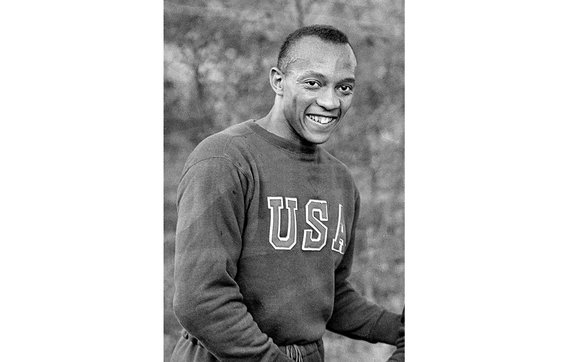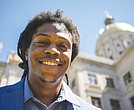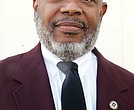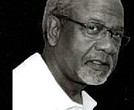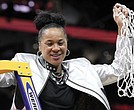Jesse Owens had backup
17 other black athletes competed on 1936 U.S. Olympic team
Fred Jeter | 3/4/2016, 7:14 a.m.
Adolf Hitler’s bigoted theory on “Aryan supremacy” took a terrible beating at the 1936 Summer Olympics in Berlin, Germany.
A talented band of African-American athletes led by Jesse Owens blew up Hitler’s hateful propaganda and kicked the rubble in his face.
The current biopic “Race” focuses on Owens’ gallant efforts in overcoming social injustice at home and abroad to strike gold four times in Nazi Germany.
The tribute is well deserved.
However, it should be noted Owens had plenty of company on the victory podium.
A total of 18 African-Americans (16 men, two women) competed, facing fears of violence. That was three times the number of African-Americans who competed at the 1932 Olympics in Los Angeles.
The U.S. team’s African-American contingent dominated track and field events in the 1936 games with 13 medals, plus one African-American athlete won a medal in boxing.
“Race,” starring Canadian Stephan James as Owens, examines the political wheeling and dealing behind the scenes at the time with International Olympic Committee (IOC) President Avery Brundage.
The NAACP was among the voices urging U.S. black athletes — particularly Owens — to boycott the Berlin games for their own safety and to demonstrate solidarity for the oppressed.
Starting with the incomparable Owens, here are the black Americans — all of whom are deceased now — that made Hitler squirm:
Owens: In arguably the greatest track and field performance in history, the Ohio State University legend won the 100-meter, 200-meter and long jump and ran the second leg of the victorious 4x100 relay.
Mack Robinson: Older brother of baseball icon Jackie Robinson. The University of Oregon athlete took the silver medal in the 200-meter. He was a mere 0.04 seconds behind Owens.
Archie Williams: Before earning a degree in chemical engineering at University of California-Berkeley, he won gold in the 400-meter, thwarting the Fuhrer.
John Woodruff: Known as “Long John” for his 6-foot-3 frame, the University of Pittsburgh strider won gold in the 800-meter.
Ralph Metcalfe: The Marquette University speedster was second in the 100-meter and ran a leg in the 4x100 relay. He later served in the U.S. House of Representatives from Illinois and co-founded the Congressional Black Caucus.
Fritz Pollard Jr.: Son of the football coach-star of the same name, the younger Pollard went to the University of North Dakota and captured the bronze medal in the 110 high hurdles.
Cornelius Johnson: After finishing fourth as an 18-year-old at the 1932 Olympics, the Compton College leaper took the gold in the high jump in 1936.
David Albritton: An Ohio State teammate of Owens, Albritton took the silver medal behind Johnson in the high jump. He later served in the Ohio House of Representatives.
James LuValle: Took the bronze medal in the 400-meter in Germany before earning a degree in chemistry at UCLA.
Jack Wilson: A boxer. He won the silver medal in the bantam weight division.
America’s 1936 gold medal basketball team, playing outdoors, had all white players. The first black U.S. Olympic basketball player was UCLA’s Don Barksdale in 1948.
Basketball player Sam Balter was the U.S. team’s only Jewish medal winner in 1936.
In a highly controversial development at the 1936 games, two Jewish runners on the U.S. relay team — Marty Glickman and Sam Stoller — were replaced by Owens and Metcalfe on the day of the finals.
There are different theories why, one being the United States already had stepped on Hitler’s toes many times with the African-American athletes and winning the relay with two Jews might embarass him too much. Germany had banned Jews from its own Olympic team in 1936.
Owens and Metcalfe were slightly faster than Glickman and Stoller, but comparative times showed the U.S. team would have won the relay with any available combination.
Despite U.S. track and field success, Germany won the most overall medals, 89, with the United States second with 56. There were a total of 21 sports.

